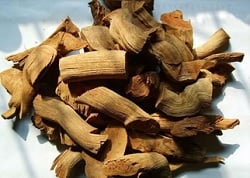 |
| The roots of the thunder god vine (Tripterygium wilfordii) from which celastrol is extracted--Courtesy of Apexbeats |
By Oliver Worsley
Successful drug development targeting obesity has been largely disappointing in recent years. Ultimately, bariatric surgery remains the only effective solution for many to reduce body weight and improve associated comorbidities.
Umut Ozcan and his team at Harvard Medical School, though, see some real potential in a recently isolated extract, celastrol, found in the roots of the thunder god vine (Tripterygium wilfordii) used in traditional Chinese medicine.
Celastrol works by enhancing leptin, an appetite-suppressing hormone that has received great attention over the past two decades for its anti-obesity potential. Although targeting leptin pharmacologically has mostly failed due in part to leptin resistance, Ozcan claims celastrol has demonstrated significant beneficial effects in obese mice.
Ozcan's team is made up of experienced researchers in the field of obesity. Indeed, several years ago, his team established the link between leptin resistance and a stress response emitted from the endoplasmic reticulum (ER) in the cell.
In the current study leveraging modern sequencing capabilities coupled to high-throughput screening of candidate small molecules, they showed that celastrol had favorable expression profiles in the hypothalamus (a major site of leptin resistance) which associated with improved ER function and leptin sensitivity.
Results appear striking; they reported up to an 80% reduction in food intake in leptin-resistant mice after just 7 days of celastrol treatment.
Ultimately, the treatment caused caloric suppression that led to a 45% loss of their initial body weight--quite remarkable as this is more dramatic than the weight loss you would observe following bariatric surgery, according to Ozcan's team. While they saw no changes when celastrol was administered to lean mice or leptin-deficient mice, they were confident the weight loss is occurring through leptin-sensitization. They also reported improvements in liver function, cholesterol levels and glucose metabolism--all of which go awry in the plethora of metabolic disturbances seen in patients with central obesity, implying potential further benefit for these types of patients.
As they have yet to initiate first-in-man clinical trials, the team cautions against its use until toxicology and safety profiles have been done on celastrol, as well as the thunder god vine.
- here's the abstract